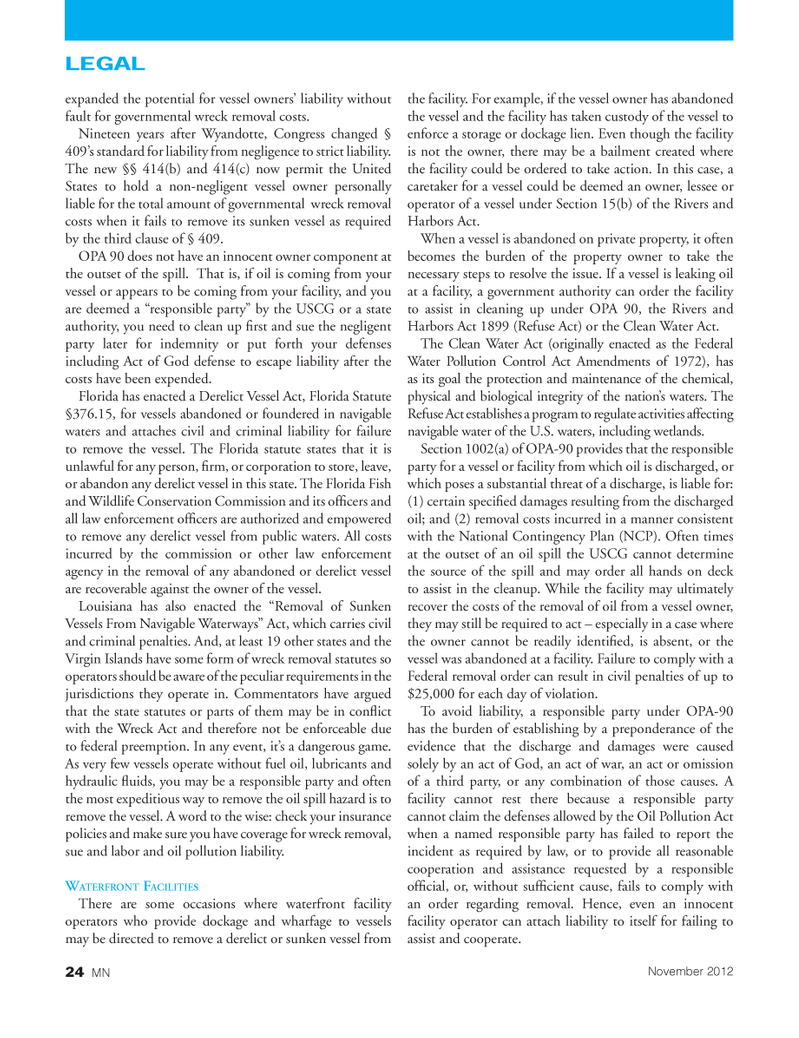
Page 24: of Marine News Magazine (November 2012)
Workboat Annual
Read this page in Pdf, Flash or Html5 edition of November 2012 Marine News Magazine
LEGALexpanded the potential for vessel owners? liability without fault for governmental wreck removal costs. Nineteen years after Wyandotte, Congress changed § 409?s standard for liability from negligence to strict liability. The new §§ 414(b) and 414(c) now permit the United States to hold a non-negligent vessel owner personally liable for the total amount of governmental wreck removal costs when it fails to remove its sunken vessel as required by the third clause of § 409. OPA 90 does not have an innocent owner component at the outset of the spill. That is, if oil is coming from your vessel or appears to be coming from your facility, and you are deemed a ?responsible party? by the USCG or a state authority, you need to clean up rst and sue the negligent party later for indemnity or put forth your defenses including Act of God defense to escape liability after the costs have been expended. Florida has enacted a Derelict Vessel Act, Florida Statute §376.15, for vessels abandoned or foundered in navigable waters and attaches civil and criminal liability for failure to remove the vessel. The Florida statute states that it is unlawful for any person, rm, or corporation to store, leave, or abandon any derelict vessel in this state. The Florida Fish and Wildlife Conservation Commission and its of cers and all law enforcement of cers are authorized and empowered to remove any derelict vessel from public waters. All costs incurred by the commission or other law enforcement agency in the removal of any abandoned or derelict vessel are recoverable against the owner of the vessel. Louisiana has also enacted the ?Removal of Sunken Vessels From Navigable Waterways? Act, which carries civil and criminal penalties. And, at least 19 other states and the Virgin Islands have some form of wreck removal statutes so operators should be aware of the peculiar requirements in the jurisdictions they operate in. Commentators have argued that the state statutes or parts of them may be in con ict with the Wreck Act and therefore not be enforceable due to federal preemption. In any event, it?s a dangerous game. As very few vessels operate without fuel oil, lubricants and hydraulic uids, you may be a responsible party and often the most expeditious way to remove the oil spill hazard is to remove the vessel. A word to the wise: check your insurance policies and make sure you have coverage for wreck removal, sue and labor and oil pollution liability. WATERFRONT FACILITIES There are some occasions where waterfront facility operators who provide dockage and wharfage to vessels may be directed to remove a derelict or sunken vessel from the facility. For example, if the vessel owner has abandoned the vessel and the facility has taken custody of the vessel to enforce a storage or dockage lien. Even though the facility is not the owner, there may be a bailment created where the facility could be ordered to take action. In this case, a caretaker for a vessel could be deemed an owner, lessee or operator of a vessel under Section 15(b) of the Rivers and Harbors Act. When a vessel is abandoned on private property, it often becomes the burden of the property owner to take the necessary steps to resolve the issue. If a vessel is leaking oil at a facility, a government authority can order the facility to assist in cleaning up under OPA 90, the Rivers and Harbors Act 1899 (Refuse Act) or the Clean Water Act. The Clean Water Act (originally enacted as the Federal Water Pollution Control Act Amendments of 1972), has as its goal the protection and maintenance of the chemical, physical and biological integrity of the nation?s waters. The Refuse Act establishes a program to regulate activities affecting navigable water of the U.S. waters, including wetlands. Section 1002(a) of OPA-90 provides that the responsible party for a vessel or facility from which oil is discharged, or which poses a substantial threat of a discharge, is liable for: (1) certain speci ed damages resulting from the discharged oil; and (2) removal costs incurred in a manner consistent with the National Contingency Plan (NCP). Often times at the outset of an oil spill the USCG cannot determine the source of the spill and may order all hands on deck to assist in the cleanup. While the facility may ultimately recover the costs of the removal of oil from a vessel owner, they may still be required to act ? especially in a case where the owner cannot be readily identi ed, is absent, or the vessel was abandoned at a facility. Failure to comply with a Federal removal order can result in civil penalties of up to $25,000 for each day of violation.To avoid liability, a responsible party under OPA-90 has the burden of establishing by a preponderance of the evidence that the discharge and damages were caused solely by an act of God, an act of war, an act or omission of a third party, or any combination of those causes. A facility cannot rest there because a responsible party cannot claim the defenses allowed by the Oil Pollution Act when a named responsible party has failed to report the incident as required by law, or to provide all reasonable cooperation and assistance requested by a responsible of cial, or, without suf cient cause, fails to comply with an order regarding removal. Hence, even an innocent facility operator can attach liability to itself for failing to assist and cooperate. 24 MNNovember 2012MNNov2012 Layout 18-31.indd 24MNNov2012 Layout 18-31.indd 2410/26/2012 11:50:33 AM10/26/2012 11:50:33 AM

 23
23

 25
25
